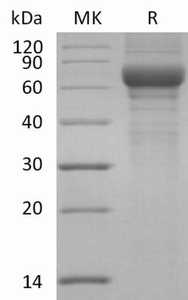| 货号: 12046 |
| 产品全名: 人 Vitronectin (N-Truncated |
| 规格: 10/50/100 µg |
| 基因符号 Complement S-protein;epibolin;Serum Spreading Factor;Serum-spreading factor;Somatomedin B;S-protein;V75;Vitronectin;VN;VNT;VTN |
| 目标蛋白: Vitronectin |
| UNIPROT ID: AAH05046.1 |
| 描述: Recombinant Human Vitronectin is produced by our Mammalian expression system and the target gene encoding Val62-Leu478 is expressed with a 6His tag at the C-terminus. |
| 背景: Vitronectin, also known as VTN, is a large glycoprotein found in blood and the extracellular matrix (ECM). Vitronectin is a plasma glycoprotein implicated as a regulator of diverse physiological process, including blood coagulation, fibrinolysis, pericellular proteolysis, complement dependent immune responses, and cell attachment and spreading. Blocking of Hic(a member of the pneumococcal surface protein C (PspC) family) by specific antiserum or genetic deletion significantly reduced pneumococcal binding to soluble and immobilised vitronectin and to Factor H, respectively. In addition, Vitronectin interact with glycosaminoglycans and proteoglycans. Is recognized by certain members of the integrin family and serves as a cell-to-substrate adhesion molecule. Inhibitor of the membrane-damaging effect of the terminal cytolytic complement pathway. |
| 物种/宿主: HEK293 |
| 分子量: 48.3 KDa |
| 分子特征: Not available |
| 纯化: Greater than 90% as determined by reducing SDS-PAGE. |
| Formulation & Reconstitution: Lyophilized from nanodisc solubilization buffer (20 mM Tris-HCl, 150 mM NaCl, pH 8.0). Normally 5% – 8% trehalose is added as protectants before lyophilization. |
| 储存和运输: Store at -20°C to -80°C for 12 months in lyophilized form. After reconstitution, if not intended for use within a month, aliquot and store at -80°C (Avoid repeated freezing and thawing). Lyophilized proteins are shipped at ambient temperature. |

Figure 1. Greater than 95% as determined by reducing SDS-PAGE. |




